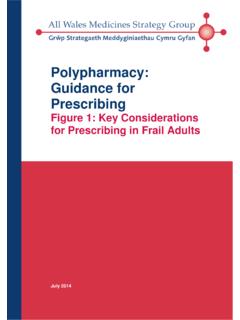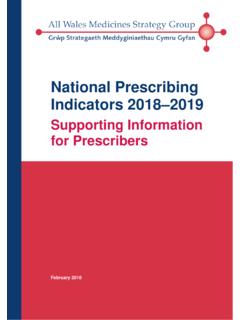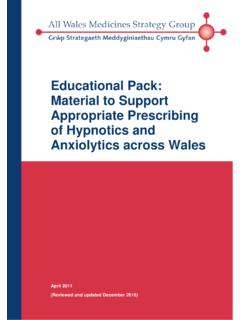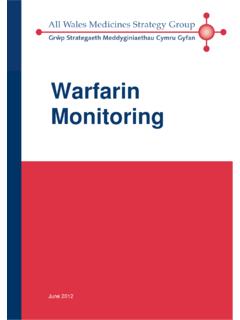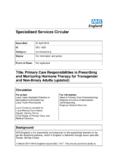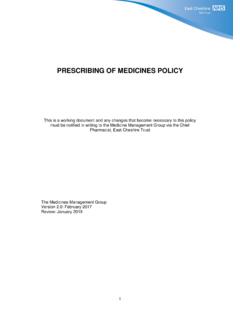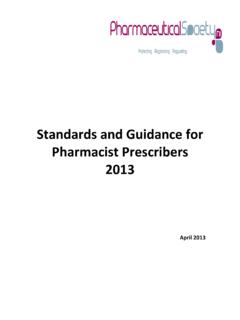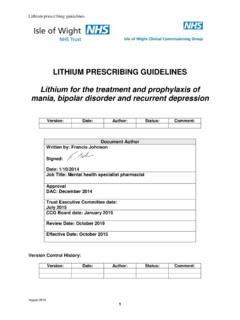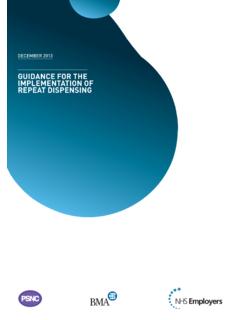Transcription of Focus on Antibiotic Prescribing - AWMSG
1 CEPP National Audit Focus on Antibiotic Prescribing March 2013 (updated June 2015) This report has been prepared by a multiprofessional collaborative group, with support from the All Wales Prescribing Advisory Group (AWPAG) and the All Wales Therapeutics and Toxicology Centre (AWTTC), and has subsequently been endorsed by the All Wales Medicines Strategy Group ( AWMSG ). Please direct any queries to AWTTC: All Wales Therapeutics and Toxicology Centre University Hospital Llandough Penlan Road Llandough Vale of Glamorgan CF64 2XX 029 2071 6900 This document should be cited as: All Wales Medicines Strategy Group. CEPP National Audit: Focus on Antibiotic Prescribing . June 2015. CEPP National Audit Focus on Antibiotic Prescribing Page 1 of 36 CONTENTS AUDIT 2 BACKGROUND.
2 2 Supporting tools .. 4 AUDIT METHOD .. 4 Sample size .. 4 Audit data .. 5 QUANTITY OF Prescribing PRIMARY CARE .. 6 1. Antibiotic Prescribing FOR SORE THROAT .. 6 2. Antibiotic Prescribing FOR ACUTE RHINOSINUSITIS ..10 3. Antibiotic Prescribing FOR UTI IN FEMALES ..12 4. Antibiotic Prescribing FOR ACUTE COUGH/ACUTE QUALITY OF Prescribing PRIMARY CARE ..19 5. FLUOROQUINOLONE Prescribing ..19 6. CEPHALOSPORIN Prescribing ..22 7. CO-AMOXICLAV Prescribing ..24 START SMART AND Focus HOSPITAL SETTING ..27 8. HOSPITAL Prescribing OF ANTIBIOTICS ..27 PRIMARY CARE PROCESSES ..30 9. DELAYED/BACK UP 10. READ CODING TO IDENTIFY HCAI ..32 FEEDBACK FORMS ..33 11. REVIEW SHEET ..33 12. CPD SHEET (FOR PERSONAL USE) ..34 ABBREVIATIONS.
3 35 REFERENCES ..36 All Wales Medicines Strategy Group Page 2 of 36 AUDIT AIMS To promote Antibiotic Prescribing in accordance with existing guidelines. To support clinicians in promoting quality improvement by reviewing antimicrobial Prescribing within their teams. BACKGROUND Where an Antibiotic is needed, the choice of agent and its use needs to be considered in order to ensure that infections are treated effectively. Broad-spectrum antibiotics such as fluoroquinolones, cephalosporins and co-amoxiclav should be reserved for the treatment of resistant disease only. This audit is underpinned by agreed PHE guidelines for the management of infection in primary care, and supports the implementation of the All Wales Medicines Strategy Group ( AWMSG ) National Prescribing Indicators (NPIs) 2014 20161,2.
4 Each audit section will be available as a standalone document on the AWMSG website. The use of Antibiotic agents is monitored as an NPI in antibacterial items per 1,000 STAR-PUs. Use is generally high in Wales when compared with other parts of the United Kingdom (see Figure 1). Total antibacterial items per 1,000 STAR-PUs (13) Quarter ending September 2014 This audit can be used to support the quality improvement required for appraisal and revalidation as described in the General Medicine Council (GMC) guide to Good Medical Practice3: The European Centre for Disease Prevention and Control (ECDC) gives the following key messages for primary care prescribers4. PowysCardiff and ValeAneurin BevanHywel DdaCwm TafBCUABMU050100150200250300350400 Items/1,000 STAR-PUsCCG/HBEngland averageWales averageCEPP National Audit Focus on Antibiotic Prescribing Page 3 of 36 Growing Antibiotic resistance threatens the effectiveness of antibiotics now and in the future Antibiotic resistance is an increasingly serious public health problem in Europe.
5 While the number of infections due to Antibiotic -resistant bacteria is growing, the pipeline of new antibiotics is unpromising, thus presenting a bleak outlook on availability of effective Antibiotic treatment in the future. Rising levels of Antibiotic -resistant bacteria could be curbed by encouraging limited and appropriate Antibiotic use in primary care patients Antibiotic exposure is linked to the emergence of Antibiotic resistance. The overall uptake of antibiotics in a population, as well as how antibiotics are consumed, has an impact on Antibiotic resistance. Experience from some countries in Europe shows that reduction in Antibiotic Prescribing for outpatients has resulted in concomitant decrease in Antibiotic resistance.
6 Primary care accounts for about 80% to 90% of all Antibiotic prescriptions, mainly for respiratory tract infections. There is evidence showing that, in many cases of respiratory tract infection, antibiotics are not necessary and that the patient s immune system is competent enough to fight simple infections. There are patients with certain risk factors such as, for example, severe exacerbations of chronic obstructive pulmonary disease (COPD) with increased sputum production, for which Prescribing antibiotics is needed. Unnecessary Antibiotic Prescribing in primary care is a complex phenomenon, but it is mainly related to factors such as misinterpretation of symptoms, diagnostic uncertainty and perceived patient s expectations.
7 Communicating with patients is key Studies show that patient satisfaction in primary care settings depends more on effective communication than on receiving an Antibiotic prescription and that Prescribing an Antibiotic for an upper respiratory tract infection does not decrease the rate of subsequent return visits. Professional medical advice impacts patients perceptions and attitude towards their illness and perceived need for antibiotics, in particular when they are advised on what to expect in the course of the illness, including the realistic recovery time and self-management strategies. Primary care prescribers do not need to allocate more time for consultations that involve offering alternatives to Antibiotic Prescribing .
8 Studies show that this can be done within the same average consultation time while maintaining a high degree of patient All Wales Medicines Strategy Group Page 4 of 36 Supporting tools Royal College of General Practitioners (RCGP) TARGET Antibiotics Toolkit: - Leaflets to share with patients - Resources for clinical and waiting areas - National Antibiotic guidance - Training resources - Audit templates - Self assessment checklist - Resources for commissioners - Useful links - Background information PHE (2014) Management of infection guidance for primary care for consultation and local adaptation Welsh Medicines Resource Centre (WeMeReC) (2012) Appropriate Antibiotic use whose responsibility? WeMeReC (2012) Appropriate antibiotics for respiratory tract infections STAR Educational Programme ECDC.
9 Toolkit of briefing materials aimed at primary care prescribers National Institute for Health and Care Excellence (NICE) (2008) Clinical Guideline (CG) 69: Respiratory tract infections AUDIT METHOD The audits are enclosed for the use of health boards or individual prescribers. A range of criteria has been provided to enable health boards and clinicians to Focus on specific areas of Prescribing ; it is not envisaged that a practice would undertake all audit options in one year. It is recommended that this work is carried out by clinicians, as this will enhance ownership, leading to more effective change. Prescribing data should be considered and a decision reached as to which elements of the tool are most likely to have a positive impact on Prescribing practice.
10 This may mean focusing on Antibiotic groups, where specific issues are identified, or looking at Prescribing in clinical scenarios where general quantity is more of an issue. The process sections will support the use of delayed/back up Prescribing and identification of healthcare-acquired infections (HCAI). Sample size Prescribers should ensure that an adequate number of consultations are analysed to determine compliance with the audit standards and to provide a basis for discussion. Welsh GP practices will be advised on sample size by the health board medicines management team. If further guidance on sample size is required consider the following: If undertaking an in-depth review of a single specific audit section, consider assessing ten cases per prescriber within the practice.
